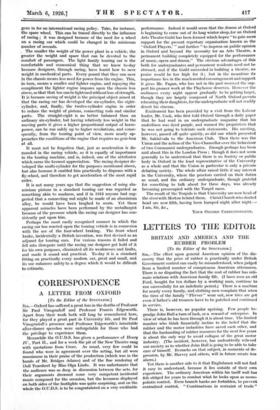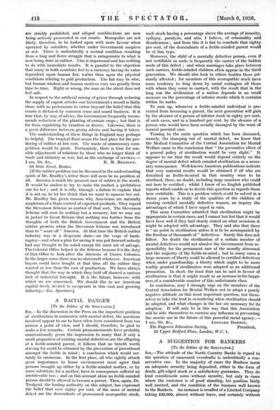LETTERS TO THE EDITOR BRITAIN AND AMERICA AND THE RUBBER
PROBLEM [To the Editor of the SPECTATOR.]
Sra,—The effect upon general American opinion of the dis- covery that the price of rubber is practically under British Government control can easily be misunderstood, when judged from a limited number of conspicuous American utterances. There is no disputing the fact that the cost of rubber has inti- mate relations with American family life. (I have seen an old Ford, bought for ten dollars by a working man, continue to run successfully for an indefinite period.) There is a machine for nearly every family, and clothing men complain that when the tires of the family " Fliwer " wear out, new tires are got even if father's old trousers have to be patched and continued in service.
There is, however, no popular uprising. Few people be- grudge John Bull a turn of luck, or a reward of enterprise. In view of what he has been through it is about time. The limited number who think financially incline to the belief that the rubber and the motor industries have saved each other, and that the husbanding of rubber resources for the next few years is about the only way to avoid collapse of the great motor industry. (The incident, however, has undoubtedly relieved our anxiety as to whether John Bull is going to be able to take care of himself. Remarks on that subject, in moments of de- pression, by Mr. Harvey and others, will in future create less alarm.)
Yet there is another side to it that Englishmen will not find it easy to understand, because it lies outside of their own experience. The ordinary American within his tariff wall has felt obliged for years to combat what he looks upon as mono- polistic control. Even branch banks are forbidden, to prevent centralized control. " Combinations in restraint of trade " are strictly prohibited, and alleged combinations are now being actively prosecuted in our courts. Monopolies are not likely, therefore, to be looked upon with more favour when operated by outsiders, whether under Government auspices or not. There is undoubtedly a mental condition resulting from a long and fierce struggle that is antagonistic to what is now being done in rubber. I his is impersonal and has nothing to do with immediate results. It is parallel to the objection that many in both countries feel to a currency having its value dependent upon human fiat, rEi her than upon the physical conditions relating to gold production. The fiat may be wise, but human wisdom and human motives vary too greatly from time to time. Right or wrong, the man on the street does not feel safe.
In respect to the artificial raising of prices through reducing the supply of export articles our Goverrubent's record is fairly clear, with no pretensions to virtue beyond the belief that this course is dictated by common sense and sound business. It is true that, by way of advice, the Government frequently recom- mends reduction of the, planting of certain crops ; but that is far from regulating by ,taxation or decree, Likewise, there is a great difference between giving advice and having it taken.
The understanding of these things in England may perhaps be helpful. The tropical East seems the best place for the pro- ducing of rubber at low cost. The waste of unnecessary com- petition would be great. Fortunately, there is time for sen- sible adjustment of relations by those who no longer think of trade and industry as war, but as the exchange of services.— [If the rubber problem can be discussed hi the understanding spirit of Mr. Bradley's_ letter there will soon be no problem at all. America is much the greatest user of rubber in the world. It would be useless to try to make the market a prohibitive one for her ; and it is silly, through a failure to explain that it is not so, to let her think that we want to squeeze her out. Mr. Bradley has given reasons why Americans are naturally suspicious of a State control of exported products. They regard the Stevenson Scheme as control of that sort. The Stevenson Scheme will soon be nothing but a memory, but we may say in justice to Great Britain that nothing was further from the thoughts of both the British Government and the British rubber growers when the Stevenson Scheme was introduced than to " score off " America. At that time the British rubber industry was in a desperate state—on the verge of bank- ruptcy—and when a plan for saving it was put forward nobody had any thought in his mind except the mere act of salvage. The Colonial Office helped in the Scheme because it is the duty of that Office to look after the interests of Crown Colonies. In the larger sense there was no statecraft whatever. American buyers could have bought at that time all the rubber they wanted at less than the cost of production. We have always thought that the way in which they held off showed a curious lack of industrial foresight. It is the future, however, with which we are concerned. We should like to see American capital freely invited to co-operate in this vast and growing industry.—En. Spectator.]







































































 Previous page
Previous page